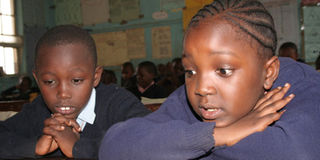Fathers and homework ‘are a mess’

City primary School pupils Schenelle Amondi (right) and Lincoln Kiprop. Photo/ PHOEBE OKALL
Nine-year-old Lincoln Kiprop is concentrating on the English lesson at City Primary School, writing down new words from the list on the blackboard.
Like many other pupils around the country, his mother is more likely to help with homework than his father. The Standard Three pupil came top of his class of 25 last term.
Nearby is eight-year-old Schenelle Amondi, also in Standard Three. Her favourite subject is English. “I enjoy learning new words which I use in my sentences every day,” Amondi says. The classmate of Kiprop came third in her class last term.
The girl describes learning English words as “fun” and says she does not hesitate to ask for help whenever she encounters a word she cannot read. Her dream career is to be doctor. “My mother helps me with homework in the evening,” Amondi says.
Lincoln and Schenelle have something in common. On Monday, the Kenya National Examinations Council released the report on monitoring learner achievement for their class — Standard Three.
According to the findings, 51 per cent of pupils are helped at home with homework, with siblings rating the highest at 43.4 per cent. Mothers come in second with 36.4 per cent.
As the report was released, Education minister Sam Ongeri expressed concern over the low number of fathers assisting their children with homework. “Fathers, you are a mess... A total mess,” Prof Ongeri said, pointing out that responsibility did not end with birth.
For now, Amondi is the only pupil at home; her youngest sister is only eight months old. She spends Saturday playing with friends while Sunday is dedicated to church and outings with her mother who runs a business.
Mrs Alice Akunga who teaches Standard Three classes at City Primary and describes the experience as “a fulfilling vocation”. When Nation visited, Mrs Akunga had combined the two streams for an English lesson.
Standard Three
“By Standard Three, a pupil should read simple words like ‘book’ or ‘hospital,’” Mrs Akunga said. According to her, multiplication tables are also introduced at this level where the student is expected to master simple duplication arithmetic.
In Social Studies, Mr Akunga says, pupils are taught about their environment, how to observe personal hygiene and learn about the basic human needs like food, clothing and shelter.
“Parts of the body are also taught in the Standard Three where the pupil is expected to explain their functions,” Mrs Akunga pointed out. Physical education and life skills are also taught; pupils engage in exercise and gymnastics like frog jump.
Mrs Akunga pointed out that the average age of Standard Three pupils are eight years. Sickness of either parent or pupil and lack of bus fare are some reasons children were absent.
“Some pupils miss more than three days so by the time they resume class, peers are covering other lessons,” Mrs Akunga said. However, she coaches such a child to catch up with the rest.
Deputy headmaster James Karekei welcomed the Standard Three assessment released on Monday, saying it would enable teachers to monitor pupils’ progress. “The report will help track the quality and progress of pupils at an early age,” Mr Karekei said on Monday at the school.
He discouraged the trend in some schools where pupils are forced to repeat classes, saying a child’s performance could be solved through the use of a learner-centred approach where teachers paid attention and helped with learning difficulty.
The study involved pupils 7,931 from 328 schools drawn from 156 districts in all the provinces.




